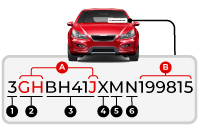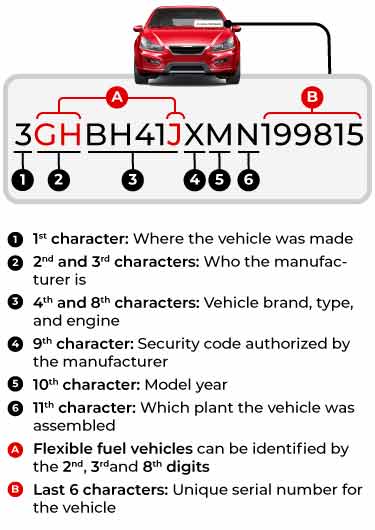
Written by Kayla Jane Barrie Updated on Dec 12, 2025 5 mins read

A VIN is an essential piece of information for vehicle owners. To get a vehicle permit, coverage, or car ownership in Ontario, you must have a valid and accurate number.
Your car's VIN is a crucial identifier that records everything from an accident to an oil change. Insurers adjust premiums based on information from the insurance VIN check. In this blog post, we explain why it is important, how to check and look it up, and how to decode the characters.
A vehicle identification number (VIN) is a 17-character long code containing information about your car's unique features, manufacturer, and specifications. It also tracks vehicle history, warranty claims, theft, accidents, recalls, and insurance coverage. It is the identifying code for the specific vehicle. It is commonly known as your car's fingerprint – no two vehicles on the road have the same pin. Every car manufactured after 1981 has a VIN.
Your VIN should match in every place it's marked in your vehicle and your insurance slip to ensure you have the right vehicle covered. If you are buying a used car, you should check the VIN to verify the car's history and make sure you are not a victim of a car insurance scam.
With the rise of keyless car theft by organized crime, many salvaged vehicles end up back in the market. Salvaged vehicles are generally less insurable than non-salvaged ones, so exercise caution when purchasing a vehicle.
Always conduct a VIN check and request an inspection before buying a used car to avoid purchasing a vehicle with significant accident history or hidden damages.
Policies for car insurance in Ontario require you to provide a VIN, a unique number assigned to each vehicle. The VIN contains data about the car's driving history, and insurers use this information to determine the price of their policies accordingly.
Your VIN will not impact your rate unless your insurer finds that the vehicle was involved in a previous accident or theft.
The VIN is found on the vehicle's driver’s side, looking in from the windshield. Look in the bottom right corner. It can also be found on the doorpost and inside the driver's side door. Documents such as vehicle ownership records, service records, and insurance coverage will also include the number. If for any reason, you do not have access to the vehicle in the event of buying a used car, ask the seller to provide it to you so you can run a VIN check.
A VIN provides you with important information about a vehicle. Having a VIN can help you track a vehicle across its lifespan. It can help you in many situations, such as getting a car insurance quote, and the following :
It is recommended to check all VIN locations on your vehicle to ensure they are all the same. Match the number with the vehicle's original registration form and check if the number provides the right year, model, make, and vehicle colour.
There are free online VIN decoders to help with the process. You should also check for signs of tampering (scratched numbers, mismatched rivets, glue, or paint over the area). This could be a sign of someone trying to change or hide the original number, which could change the VIN's data or prove it is a stolen car.
Ensure that the number on your vehicle ownership permit matches the VIN plate on the dashboard. Contact the motor vehicle licensing/registration office immediately if there is any discrepancy.
If the VIN on the pink liability card does not match the VIN plate on the dashboard, contact your insurance agent or local police as soon as possible.

You might think this code is a random mix of 17 characters, but each combination has specific information identifying the manufacturer, make, model, and year. Here is how the numbers break down:
1 : Decode the meaning of the first number or letter. This character will tell you where the vehicle was made.
2 : Decode the second and third digits. These characters will tell you who the manufacturer is. The third digits will provide the exact division of the manufacturer, such as General Motors. Some examples include :
3 : The vehicle descriptor section. The next five numbers will tell you the brand of the car, engine, and the type of vehicle it is.
4 : The ninth number is used to prove the VIN is not a fake.
5 : The tenth number will indicate the year the car was made. For example, if the vehicle was made in 2010, it should have the letter A.
6 : The eleventh number will tell you the exact plant that made the vehicle. This digit is specific to each manufacturer.
A : Flexible fuel vehicles can be identified by the 2nd, 3rd and 8th digits
B : The final numbers. The last digits act as a serial number for the car, and what makes the VIN original to that car.
If the car was stolen or ever deemed unsafe for driving, the VIN could have been tampered with so the car could still be sold. Aviva Canada has reported a staggering 10-fold increase in vehicle reVINing since 2022. This criminal practice involves stealing vehicles and replacing their original VINs with forged ones, making them appear legitimate. These re-VINed vehicles are then sold to unsuspecting buyers, who are unaware of their true history and potential risks.
Criminals may try to hide a car's history by:
After you review your VIN, you should contact your province's motor vehicle licensing/registration if you notice any discrepancies. If you notice the VIN does not match any insurance documents, contact your insurer or local police as soon as possible.
If you notice a VIN is not 17 numbers long, it generally means the vehicle was made before 1981 and will not decode appropriately with new search systems. The information on cars before 1981 is limited. It's common for classic cars to have this issue.
The VIN is a specific 17 characters that are assigned to your vehicle during the manufacturing process. It always stays the same and contains essential information about your car, such as make, model, year, and warranty information.
You can check your vehicle warranty by providing the VIN to your dealership. You can find your VIN on the front dash of your driver's side windshield, inside your car door, or policy. They can provide you with what is and is not covered under your warranty.
Yes – a VIN can tell you everything about the vehicle's history, from car theft, weather damage, and warranty information. If you found a good deal on a used car, you should ensure it has a clean history before buying it. .
Yes, you can use your VIN to find car parts. By sharing the number with your car parts dealer, they can fine-tune the parts to ensure they fit your make and model.
Having an accurate and valid VIN can ensure you are driving a road-safe vehicle. If you notice issues with your VIN or notice there are issues, address them right away.
| Categories | Auto |
|---|---|
| Tags | Auto CoverageBuy and Sell Vehicles |
Read our insurance blog to get helpful tips, information and news.
Big changes are coming to Ontario car insurance. Starting July 1, 2026, many accident benefits will become optional. Learn how these "à la carte" reforms impact your coverage and why opting out could be a major financial risk.
Learn about Canada's new Electric Vehicle Affordability Program (EVAP). Discover how the $50,000 transaction rule works, which cars qualify, and how to claim your rebate.
Fatal collisions in Canada rose 9.14% from 2019 to 2023. Discover the latest road safety statistics, provincial rankings, and how these trends affect your auto insurance rates.
Find out if a seatbelt ticket will raise your car insurance rates and how insurers view seatbelt violations.